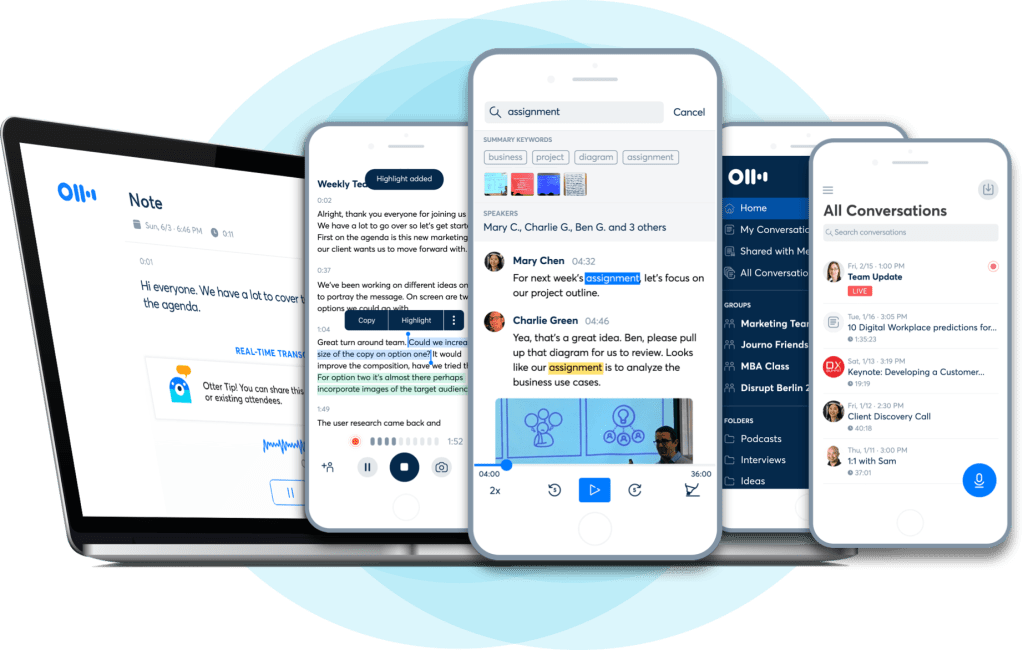Over the past year or so, voice transcription startup Otter.ai doubled down on the future of remote work by integrating its product with meeting apps like Zoom and Google Meet. With the COVID-19 pandemic having sent so many to work from home, those investments have paid off — the company has transcribed over 100 million meetings with more than 3 billion minutes, and has seen an 8x increase in revenues during 2020. Now, Otter.ai is announcing its next steps, fueled by a new $50 million Series B round of investment.
The new round was led by Spectrum Equity, with participation from existing investors Horizons Ventures, Draper Associates, GGV Capital, Draper Dragon Fund and others. The $50 million figure also includes a $10 million convertible note, announced last year.
Otter.ai’s service offers an easy way to record meetings, whether in-person through an app on your phone, or online through its integrations with popular web conferencing apps. But it’s the latter that really came into play over the course of 2020, when suddenly entire workforces were sent home from the office and forced into endless Zoom calls.
With convenient timing, Otter.ai added Zoom integration back in April 2020 — the early days of the pandemic. It has now become the most popular platform for Otter.ai’s web conferencing users.
“I think with the pandemic, we’ve seen a huge shift in consumer behavior — especially in meeting behavior and education behavior, which are two key use cases for Otter,” says Otter.ai CMO Kurt Apen. “You see a lot of teams that are using Otter in the business and you see a lot of students and universities that are using Otter for accessibility. And we think that shift in behavior is going to be permanent,” he notes.
Otter.ai’s newest feature offers live, interactive transcripts of your Zoom meetings
Though the company doesn’t talk user numbers or revenues, specifically, it claims to have “many millions” on its standalone product, not counting the users it reaches through Zoom. And as those users discover Otter.ai’s free service, many later upgrade to its premium plans, which include the ability to record more minutes and access other business-grade features.
To date, this sort of backdoor entry point to the corporate market — through individual employees first, not the companies — has somewhat mirrored the trajectories of other popular business apps, the company believes.
“Actually, if we look at our growth trajectory in the last few years, it matches pretty well against the growth trajectory of Slack and Zoom,” said Otter.ai founder and CEO, Sam Liang. “So we’re pretty confident that, in the next few years, we’re continuing to grow.”
In other words, Otter.ai’s adoption may have been accelerated by the pandemic, but the larger impacts to business culture that took place in 2020 aren’t going away even when the pandemic ends. Not everyone will be going back to the office. But for those who do, Otter can work there, too.
The company has found some traction with businesses like professional services, pharmaceutical companies, financial services and other multinationals where employees work across time zones. Longer-term, Otter.ai aims to better serve its corporate use cases by extending beyond meeting transcripts into an area it likes to call “conversation intelligence.”
That involves leveraging AI technology to extract meaning from the transcripts by allowing the system to learn what’s important based on the time spent on topics, the intonation of voices and the sentiment of the conversations. It would do this in an automated way, as well, much like it works today.
Otter.ai, however, is not a service meant for highly confidential conversations. The recorded conversation is encrypted in transit and at rest, but is decrypted while processing. The conversations also have to be decrypted to create the index. Plus, Otter.ai transcripts are used as training data to improve its accuracy — learning from users’ manual corrections, from new accents, and the like.
This could ultimately prove to be a limiting factor to large-scale adoption within more sensitive business contexts. But Otter, nevertheless, remains focused more so on its work-related uses cases for the time being, rather than the numerous other areas where its technology can be used — like podcast transcriptions, integrations with social audio apps (like Clubhouse), online events and more. Otter.ai is serving these markets, but it’s preparing to staff up in sales to gain more corporate clients.
In addition to sales, where it also expects to hire a VP of Sales, Otter plans to grow its now 25-person team with additions across R&D, marketing, AI science, backend and frontend engineering, design and product management. By year-end, it believes it will triple its headcount with the new hires — some of whom may be remote workers.
Otter.ai will also invest the new funds into raising awareness for its app through channels like social and search, content marketing, organic social and more. And it will work to grow revenues through continued free to paid conversations and develop its technology.
AI-powered transcription service Otter.ai can now record from Google Meet
John Connolly, managing director at Spectrum Equity, has now joined Otter’s board.
“As the workplace has evolved and online meetings are the new normal, Otter.ai is at the
forefront leading the transformational shift of the future of work and more effective online
interactions,” he said, in a statement. “We are thrilled to be partnering with Sam and the entire team at Otter.ai to support the company’s continued market leadership. We look forward to providing the guidance and strategic resources to drive focused product innovation and operational growth.”































Comment